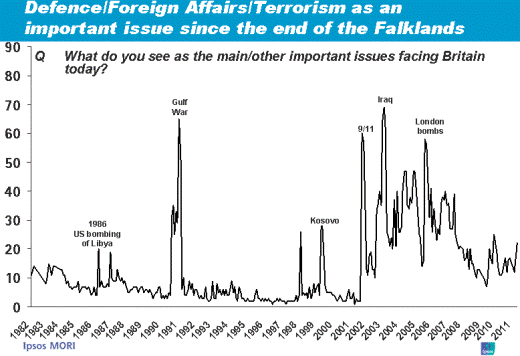Intervention in Libya, and public opinion around our involvement
![]()
Earlier this year we asked the public if they were satisfied or dissatisfied with the way that the government was handling the crisis in Libya and opinion was mixed; 42% said they were satisfied and the same percentage said that they were dissatisfied. This question was asked between 11-13 March, a week before the first air strikes took place, when the emphasis was on safeguarding British citizens. It is perhaps no surprise that those who approved of how the government was handling the crisis were more likely to be satisfied with the coalition government – including Lib Dem voters and AB respondents.
In our April polling on Libya, however, support seems to be ebbing, just over two fifths (43%) are satisfied with David Cameron and the government’s response while 57% are dissatisfied. General support for the conflict is evenly balanced; 50% support it while 49% oppose it.
Support for the conflict and satisfaction with the government is higher in the USA, but highest in France, where 63% support the action, and half (50%) support Sarkozy and the French government, indicating that the hard line he has taken on Libya has paid dividends.
Timing, apparently, is everything, as domestic spending cuts could be making allied involvement less appealing; four fifths (79%) agree that, given the current economic climate, we cannot afford to be taking military action in Libya, despite the majority (63%) also agreeing that the allied forces should seek to remove Gaddafi from power.
Concern about Libya will be tracked in the long term on our Issues Index, a monthly measure of the most important issues. From our April Issues Index, conducted between 1-7 April, we can see that it has had an impact; a fifth (22%) of the public are concerned about defence/foreign affairs/terrorism, an increase of ten percentage points since February, and the highest level of concern about foreign affairs since November 2009, after 5 British soldiers were killed by a Taliban assassin.

Indeed, the issue of defence/foreign affairs is one of the most volatile issues that we have tracked over time, and can rise and fall sharply as a response to international conflicts, or terrorist attacks. However, it is the threat to British lives that concerns us the most; the public was most concerned about this issue during the two conflicts in Iraq; in Jan 1991 concern was at 65% and, in February 2003 69%, on both occasions as ground forces were en route to Kuwait. By contrast, during the last aerial bombardment of Libya, in April 1986, as with now, around a fifth were concerned (20%).
Based on the conflicts of the last 20 years, and the public’s reaction to them, it is unlikely that concern about foreign affairs as an issue will increase, unless our involvement in Libya stretches beyond an airborne assault. However, with two thirds (62%) concerned about the economy, should the media’s focus shift more towards the cost of the conflict, then this might fuel the flames of dissatisfaction and government disapproval.



